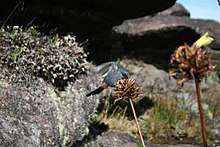Greater flowerpiercer
The greater flowerpiercer (Diglossa major) is a species of bird in the family Thraupidae. It is found in the tepuis of western Guyana, eastern Venezuela and far northern Brazil. Its natural habitats are subtropical or tropical moist montane forests and subtropical or tropical high-altitude shrubland.
| Greater flowerpiercer | |
|---|---|
 | |
| Feeding from Orectanthe sceptrum | |
| Scientific classification | |
| Kingdom: | Animalia |
| Phylum: | Chordata |
| Class: | Aves |
| Order: | Passeriformes |
| Family: | Thraupidae |
| Genus: | Diglossa |
| Species: | D. major |
| Binomial name | |
| Diglossa major Cabanis, 1849 | |
Description
The greater flowerpiercer grows to a length of about 16.5 cm (6.5 in) and is larger than any other species in the genus. The adult has a black mask but is otherwise a bluish-slate colour, with a silvery moustachial streak and silvery streaks on the crown and mantle. It has a chestnut crissum (the area around the cloaca). It is unlikely to be confused with related species because no other members of the genus shares its range.[2]
Distribution and habitat
The greater flowerpiercer occurs around the tepuis (flat-topped mountains) that are found in the southeastern part of Venezuela and the adjoining areas of northern Brazil, eastern Bolivia and western Guyana. Its altitudinal range is from 1,300 to 2,800 m (4,300 to 9,200 ft) but it is most common above 1,800 m (5,900 ft). It typically occurs in clearings and edges of montane forest, in shrubland and stunted woodland.[1][2]
Ecology
This bird usually forages alone or in pairs, but sometimes joins small mixed species groups. It feeds on insects as well as nectar which it extracts by probing and piercing flowers.[2] The nest is constructed of grasses and fine twigs and is cup-shaped. It is built among rocks, often under an overhang.[3]
Status
The greater flowerpiercer has a somewhat restricted range but, although the population size has not been quantified, the trend is thought to be downwards because of the gradual decline in the quality of its habitat. The bird is described as being "fairly common but patchily distributed", and the International Union for Conservation of Nature has assessed its conservation status as being of "least concern".[1]
References
- BirdLife International (2012). "Diglossa major". IUCN Red List of Threatened Species. 2012. Retrieved 26 November 2013.CS1 maint: ref=harv (link)
- Ridgely, Robert S.; Tudor, Guy (2009). Field Guide to the Songbirds of South America: The Passerines. University of Texas Press. p. 375. ISBN 978-0-292-71748-0.
- Hilty, S.; Kirwan, G.M. "Greater Flowerpiercer (Diglossa major)". Handbook of the Birds of the World Alive. Lynx Edicions, Barcelona. Retrieved 25 October 2017.
